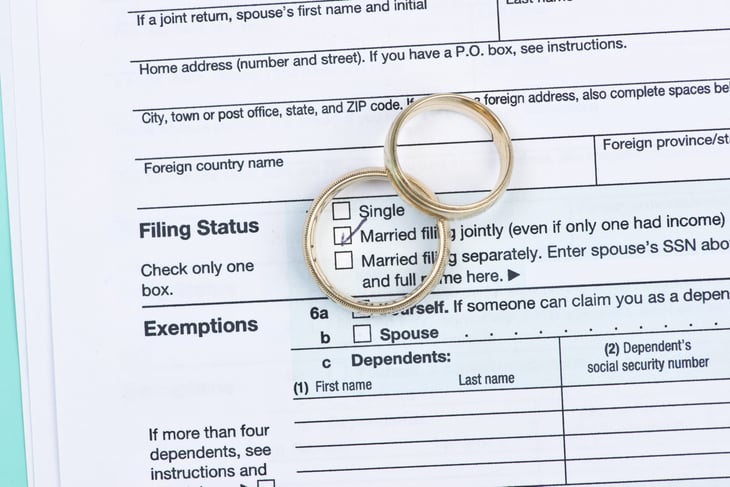
The filing status that you select for your federal tax return affects more than just the “Filing status” section of your return.
It can affect everything from your standard deduction to your eligibility for certain tax credits. In short, it can affect your tax bill itself.
Married couples can choose between two different filing statuses: married filing jointly, or MFJ, and married filing separately, or MFS.
Most married couples file a joint return since the tax code generally favors those who do. The IRS received only about 3.9 million returns with the MFS filing status for the 2021 tax year. However, in certain situations, filing separately is required or can save a couple money.
Read on to learn about situations in which filing separately might work in a couple’s favor.
Why so many married couples file jointly

Before we get into the situations in which filing separately might benefit a couple, it’s important to understand that couples potentially lose out on a lot of tax benefits by filing separately. For example, there are various tax credits that a married person can’t claim, or can’t claim in full, if they file separately from their spouse.
For this reason, the IRS advises that unless a married couple is required to file separately, the spouses should determine what their taxes would be if they filed jointly and if they filed separately.
“This way, you can make sure you are using the filing status that results in the lowest combined tax,” the federal agency says.
If you use tax software, you can do this yourself: Figure your taxes both ways and then submit your return with whichever filing status is more advantageous. If someone else does your taxes for you, you can ask them to determine which filing status is more advantageous and then use it.
1. Both spouses are high earners

A couple generally owes less in combined taxes when filing jointly rather than separately, but that’s not always the case. There are situations in which filing separately, the IRS says, could mean owing less in combined taxes than they would if they combined their taxable income on a joint return.
For example, if both spouses have high incomes, their taxable income might be subject to a higher tax rate if they combine all income sources on a joint return than if they file separately. For a couple with a combined adjusted gross income of $200,000, filing separately could mean that at least one spouse qualifies for the 22% income tax rate instead of both of them paying the 24% rate.
2. One spouse has a tax liability

When a couple files taxes jointly, both spouses may be held liable for any taxes — as well as associated interest and penalties — that are due on their joint return.
So if one spouse would owe taxes but the other would otherwise be due a refund, the other spouse might not actually receive a refund if they file jointly. By filing separately, that could be avoided.
If it turns out that one spouse owes taxes, interest or penalties because that person incorrectly reported information on a joint return, however, the IRS might relieve the other spouse of joint liability.
3. One spouse is self-employed

A self-employed taxpayer is responsible for paying all of their Social Security and Medicare taxes (collectively known as FICA taxes), unlike when someone is employed by a company, which is required to pay half of the employee’s FICA taxes. In addition, a self-employed taxpayer must estimate and pay their FICA taxes (as well as their income taxes) every quarter or possibly face a penalty and interest for late taxes.
So if one spouse in a couple is self-employed, the other spouse may decide to file separately to avoid being responsible for their partner’s FICA taxes or associated interest or penalties.
4. One spouse distrusts the other

If one spouse is worried about the other’s evasive tax practices, filing separately might help the innocent spouse avoid being held liable for their partner’s underreported income. Additionally, the loss of trust between spouses might warrant filing separately.
To be clear, though, the IRS expects you to report suspected tax fraud, which includes underreporting income. The agency has a special form for this purpose and promises to keep your identity confidential.
5. One spouse had major medical bills

Qualifying medical and dental expenses are an itemized deduction. You can deduct the amount of such bills that exceeds 7.5% of your adjusted gross income (AGI) if you itemize your tax deductions as opposed to claiming the flat-amount standard deduction.
This means that the higher the AGI is on your tax return, the less of your medical bills that you might be able to deduct. For this reason, a spouse with a lot of medical expenses might be better off filing a separate tax return so they can report a lower AGI.
6. One spouse has student loans

The U.S. Department of Education says being married can affect your student loan payment amounts if you have, or enroll in, an income-based repayment plan. With this type of plan, a higher income can translate into a higher student loan payment.
If a couple files a joint tax return and one spouse has an income-driven repayment plan, the borrower’s payment amount will be based on the couple’s combined income. If such a couple files separate returns, however, the borrower’s payment amount usually will be based on only the borrower’s own income.
So a couple filing separate tax returns — which would lower the borrower’s income — might be worth it for the borrower to have a lower student loan payment.
7. One spouse refuses to file jointly

Couples who are considered legally married at the end of a given tax year generally must file their return for that year with the same filing status as each other, especially if they lived together at any time in the last six months of the year. Neither spouse can use the joint filing status if the other refuses.
Additionally, if a couple files separate returns and one spouse itemizes their tax deductions rather than claiming the standard deduction, neither spouse is allowed to claim the standard deduction.




Add a Comment
Our Policy: We welcome relevant and respectful comments in order to foster healthy and informative discussions. All other comments may be removed. Comments with links are automatically held for moderation.